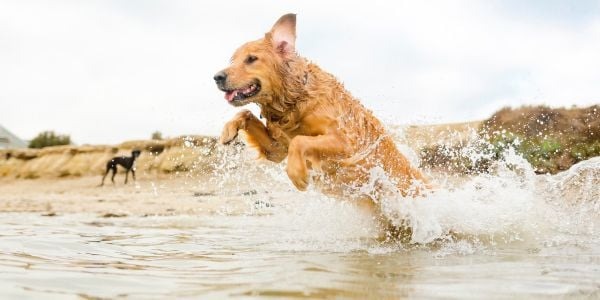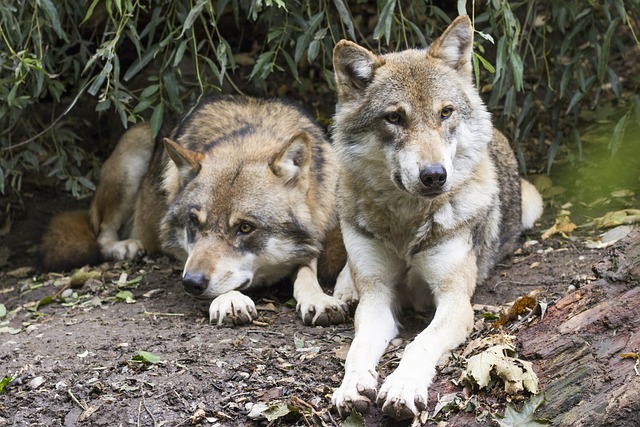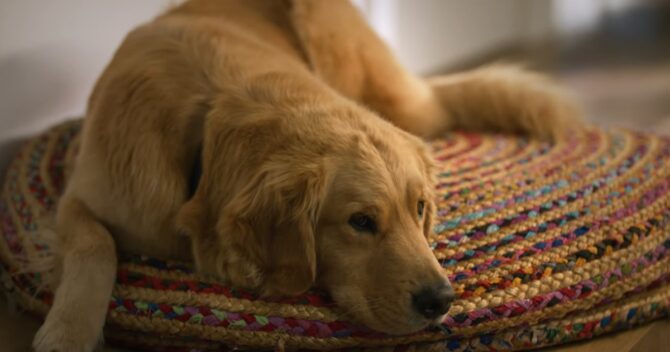Dogs do the darnedest things, don’t they? They wag their tails, they chew on squeaky toys, and sometimes, they give us a good lick. But have you ever paused to wonder why does my dog lick me? Is it a canine kiss or something more complex? Today, we’re talking about the science and psychology of doggy licks.
The Basics of Canine Behavior
Before we leap into the specific reasons why your dog might be showering you with slobbery smooches, let’s start by understanding the basic elements of canine behavior. Understanding these foundations will make it easier to discern the specific motivations behind each lick.
The Wild Roots
In the wild, canines, like wolves, use a variety of vocal and physical signals to communicate. Licking is one such behavior, often seen when a junior wolf greets a more dominant member of the pack. This ancestry might be why your domesticated fur baby feels the need to greet you with a lick after you’ve been away.
Social Creatures
Dogs are inherently social animals, which means they’re geared to live and work in packs—just like their wolf ancestors. Social interactions, including licking, help maintain a sense of harmony and structure in their community. So when your dog licks you, it’s not just random behavior but an action deeply rooted in their social makeup.
Communication 101
Your dog can’t speak human languages, but they have their ways of communicating—licking is one of them. From conveying submission to showing affection, each lick can contain a world of meaning. And you’re not just the receiver; your reaction also communicates back to your pet, helping to strengthen your mutual understanding.
1. Submissive Behavior: Showing Respect
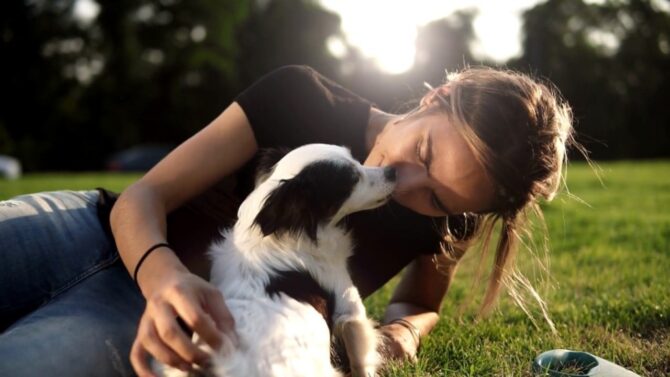
In the doggy world, rank matters. When your pet licks you, one explanation could be that they are showing you respect or acknowledging your authority as the pack leader.
Hierarchies in the Pack
In a canine pack, there’s a clear hierarchical structure. The alpha dogs get the prime spots at mealtimes and are generally treated with a form of respect by the rest of the pack. This is true for your home too, where you are seen as the alpha.
The Significance of Licking in Submission
When a less dominant dog licks a more dominant one, it’s often a submissive gesture aimed at promoting social harmony. Similarly, when your dog licks you, especially around the face, they may be acknowledging that you are in charge, and they are okay with that. It’s their way of saying, “You’re the boss, and I respect you.”
2. Affection and Bonding: More Than Puppy Love
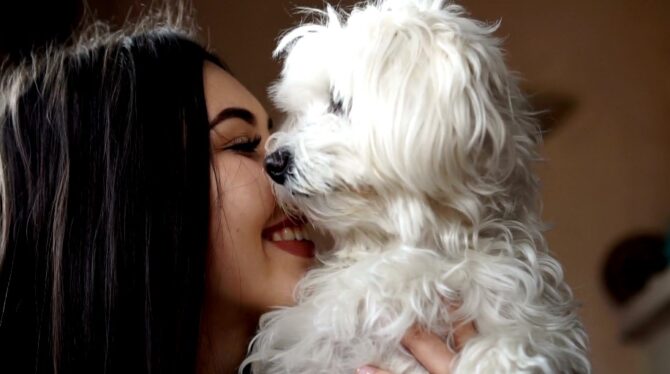
Who doesn’t love a good cuddle session with their fur baby? But when Fido licks you during these intimate moments, there’s more going on than you might think.
Oxytocin Release
- Human Perspective: In humans, acts of touch and closeness can release oxytocin, often referred to as the “love hormone.”
- Canine Perspective: Dogs also experience a surge of oxytocin when they are being petted or when they lick their owners.
More Than Just Affection
While licking certainly serves as a sign of love, it’s also a bonding mechanism for dogs. The act of licking helps them feel emotionally connected to you. This goes beyond mere affection; it’s a deeply ingrained social ritual that reinforces the bond between you and your canine companion.
3. Taste Testing: It’s Not About the Flavor
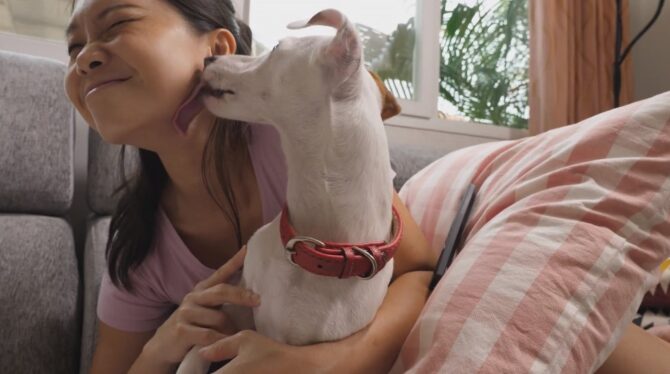
Ever wondered if you taste like chicken to your dog? Well, that’s probably not why they’re licking you. But there’s still a component of “taste testing” involved in the process.
Salty Skin
You might have noticed that your dog particularly enjoys licking you after a workout. Our skin secretes salts and other minerals, which your pooch might find appealing. It’s like you’re a walking salt lick!
Exploring Their Environment
Dogs use their mouths to explore the world just as toddlers use their hands. Licking helps them gather information about their surroundings, including you. So the next time your four-legged friend licks you, remember that they are conducting their version of a science experiment—just with less lab equipment and more tongue.
4. Grooming: Not Just a Spa Day
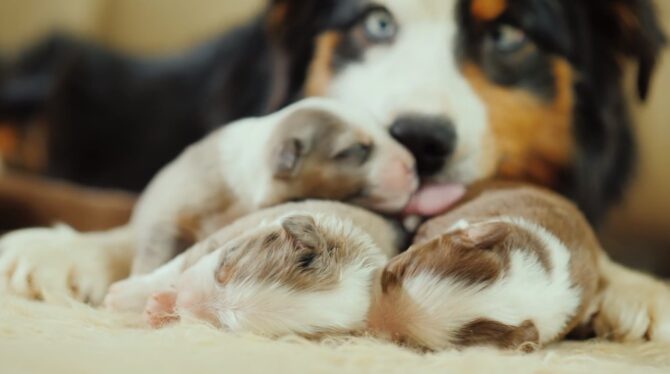
Dogs groom themselves and each other for various reasons. This behavior isn’t just about cleanliness; it’s a multifaceted ritual with implications for health and social structure.
Maternal Instincts
Mother dogs lick their puppies right from birth, both to clean them and to stimulate their bodily functions. This early experience might explain why some canines maintain a lifetime habit of “grooming” their owners.
Social Grooming
In wild canine packs, social grooming helps to strengthen bonds and establish social dynamics. By licking you, your dog could be offering a form of social grooming analogous to how primates groom each other. This could be their way of taking care of you as you take care of them.
5. Sensory Exploration: A Whole New World
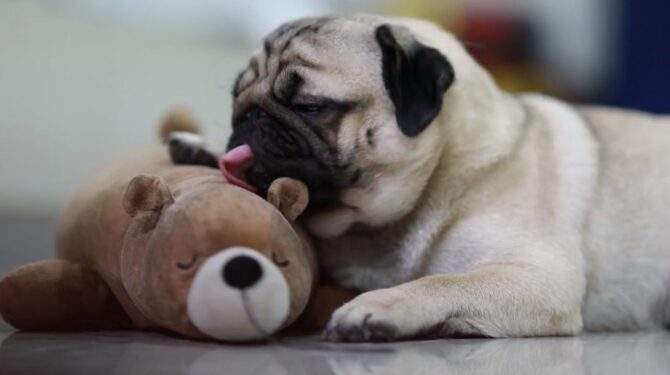
Dogs have a keen sense of smell and taste, far superior to our own. For them, licking is not just a physical action but a sensory exploration.
Smell and Taste
Your personal scent and taste provide a plethora of information for your dog. Licking you gives them insight into your emotional state, your health, and even your recent activities. For a dog, each lick is like reading a new chapter in a very intriguing book.
Licking Objects and Other Animals
Dogs often lick other things and animals, too, not just humans. This is because they are gathering information from a sensory standpoint. Each lick helps them better understand their environment and social circle.
6. Health Reasons: Beyond Behavior
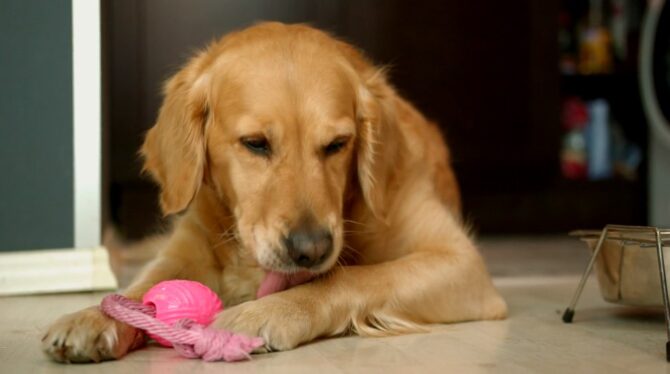
Sometimes, the reason behind your dog’s licking goes beyond social and behavioral factors. There are health-related issues that could also be at play.
Medical Concerns
In some cases, excessive licking can be a sign of underlying health issues, such as gastrointestinal problems or skin conditions. It’s essential to consult a veterinarian if you notice a sudden change in your dog’s licking behavior.
Anxiety and Stress
Dogs often use licking as a self-soothing mechanism when they’re anxious or stressed. If your dog is licking themselves or you excessively, consider the possibility of an emotional issue that may need addressing. A vet or a certified dog behaviorist can provide guidance on how to manage this.
FAQs
Is it possible that my dog licks me because they like the taste of my skin-care products?
It’s a possibility! They are curious creatures, and their keen sense of smell and taste may make them intrigued by the various lotions, creams, or even perfumes you use. However, it’s crucial to note that some skin-care products may contain ingredients that are harmful to dogs.
If you notice your pet showing a keen interest in licking areas where you’ve applied these products, you may want to consult your vet and be cautious about the products you use.
Should I discourage my dog from licking wounds?
While it’s a common belief that a dog’s mouth has antiseptic properties, letting them lick your wounds or their own is generally not advisable. A dog’s mouth contains a host of bacteria that can lead to infection. If your four-legged friend has a wound, it’s best to consult a veterinarian for proper care.
Likewise, if you have a wound, keep it covered and seek appropriate medical attention rather than relying on your dog’s tongue for healing.
My dog seems to lick me more when I’m sad or upset. Is this common?
Yes, many owners have reported that their pets lick them more when they’re emotionally down. Dogs are highly sensitive to human emotions and may pick up on your sadness or stress. Licking in this context may be a comforting or soothing gesture aimed at alleviating your distress.
However, it’s worth mentioning that the primary comfort for a dog in this situation is being close to you, not necessarily the act of licking itself.
Do dogs lick more as they get older? Is age a factor?
Age can be a factor, but it’s not universal. Some canines may lick more as they age due to increased anxiety or the development of health issues that make them more inclined to self-soothe by licking.
Conversely, some older canines may lick less due to decreased energy levels or changes in their sensory capabilities. If you notice a significant change in your older dog’s licking behavior, it may be a good idea to consult a veterinarian.
Can I train my dog to lick less?
Yes, you can train him to lick less if it’s becoming a problem. Training techniques can involve redirecting the behavior to a toy or a treat, giving a verbal cue like “no lick,” or gently pulling away and setting a physical boundary.
Keep in mind that consistency is key when training, and it may take some time for your pet to fully adapt to the new behavior expectations. In some cases, working with a certified behaviorist might be beneficial.
How do I know when my dog’s licking becomes excessive and warrants a trip to the vet?
If your dog’s licking becomes obsessive—targeting the same area repeatedly until it’s raw, red, or bleeding—it’s time to consult a vet.
Similarly, if your dog suddenly starts licking more than usual, and it’s accompanied by other symptoms like scratching, coughing, or changes in appetite or behavior, it could be an indicator of an underlying health issue that needs professional evaluation. Always err on the side of caution and consult your veterinarian for a comprehensive diagnosis.
Final Words
There you have it, the seven reasons your dog might be giving you those slobbery kisses—or conducting canine science experiments, depending on how you look at it. From the deeply rooted behaviors passed down from their wild ancestors to the unique quirks of your individual pooch, each lick tells a story.
So the next time you find yourself asking, “Why does my dog lick me?” you’ll have a deeper, nuanced understanding of what they’re trying to communicate. And that, my friends, is something to wag your tail about!


